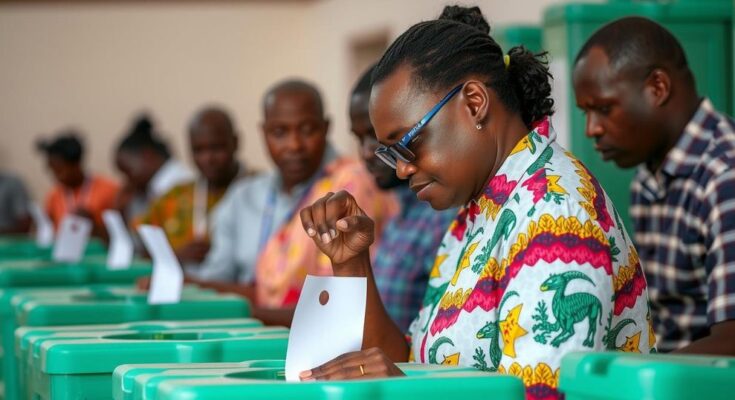Ghana’s elections on December 7 will feature key candidates Mahamudu Bawumia (NPP) and John Mahama (NDC), with citizens voting amidst serious economic concerns and issues of electoral integrity. The potential for violence poses a threat to democracy, which is crucial not only for Ghana but for the West African region as a whole, historically known for its democratic resilience.
On December 7, Ghana will conduct elections for both the presidency and Parliament across 275 constituencies. Citizens will select from twelve presidential candidates, with only the National Democratic Congress (NDC) and the ruling New Patriotic Party (NPP) being contenders for victory. Incumbent President Nana Akufo-Addo, term-limited, will not be running for a new term.
The current electoral atmosphere is heavily influenced by economic issues and political dynamics, notably the rising cost of living. The Ghanaian cedi has depreciated significantly, losing about two-thirds of its value against the US dollar over the past five years, raising concerns among voters. The NDC has also raised alarms regarding the Electoral Commission’s transparency and has been slow to sign a peace agreement with the National Peace Council. Additionally, there are serious concerns about corruption, financial mismanagement, and vote-buying; evidence indicates elected officials are implicated in the plundering of state assets and enduring political corruption.
According to the International Republican Institute (IRI), voter turnout is anticipated to be high, building upon the 78.89 percent seen in the last election. Nonetheless, there exists a substantial risk of electoral violence threatening Ghana’s democratic integrity. The current majoritarian electoral system incentivizes parties to engage in potentially harmful strategies to secure victory. Past elections, including the 2020 vote, have experienced instances of violence resulting in fatalities, reflecting the urgent need for peaceful conduct this time around.
In this election, key candidates include Mahamudu Bawumia of the NPP and John Mahama of the NDC. Both candidates carry a wealth of experience; Bawumia served as vice president for eight years and held significant roles at the Bank of Ghana, while Mahama was president from 2012 to 2017 before losing to Akufo-Addo in 2016. The prevailing context positions the upcoming election as crucial for the NPP, aiming to maintain power by “breaking the eight” with consecutive wins.
Ghana’s electoral process transcends local significance; its outcomes will impact regional stability in West Africa. Historically, Ghana has emerged as a model of democracy within the region. Therefore, ensuring a transparent and peaceful election is essential to counteract the increasing authoritarianism and democratic deterioration seen across West Africa.
Ghana’s electoral history describes a vibrant democratic landscape since the re-introduction of multiparty politics in 1992. The nation holds regular elections that have historically demonstrated a high participation rate, with civic engagement centered around pivotal economic and political issues. As the country prepares for the upcoming elections, concerns about transparency, corruption, and the potential for violence loom large, shaping the electorate’s perspectives on candidates and political parties. The political rivalry between the NDC and NPP significantly influences the direction of Ghanaian democracy and broader West African stability.
The upcoming election in Ghana on December 7 marks a critical juncture not only for the nation but for West Africa as a whole. With pressing economic issues and concerns about electoral integrity and potential violence, the stakes are high for both candidates and the electorate. Voter turnout is anticipated to reflect the population’s engagement amid these challenges, as the outcome will have lasting implications for Ghana’s democratic institutions and its role as a leader in the region.
Original Source: www.iri.org




